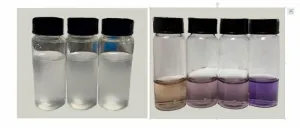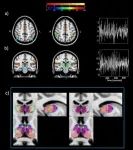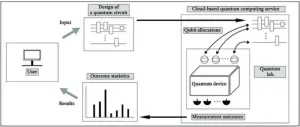(Press-News.org) AMHERST, Mass.—An interdisciplinary team led by University of Massachusetts Amherst researchers has been awarded $1.14 million over four years by the National Institutes of Health (NIH) to develop a revolutionary way of tracking body movements, with a primary application in stroke survivors’ rehabilitation and huge potential for future applications across a wide range of disciplines, health-related and beyond.
More than 795,000 Americans suffer from strokes annually, and nearly 80% of stroke survivors experience some degree of upper-limb impairment. Hemiparesis, an impairment that affects one side of the body more than the other, is especially common and comes with its own unique challenges.
“When patients are discharged, they need to keep on trying to use the affected side in order to maintain the functionality that they have gained through the inpatient rehabilitation process,” says Sunghoon Ivan Lee, associate professor in the Manning College of Information and Computer Sciences and director of the Advanced Human Health Analytics Laboratory. “If they continue to rely on the stronger side, they will lose the gains they have made. That can lead to more adverse situations like falls.”
Unfortunately, determining how much a patient is using the weaker side outside of the hospital is a challenge. “Current wearable-based solutions only provide limited information,” he says. “It does not actually let clinicians know about what activities patients are actually doing while they’re going about their daily living, which is a great indication of their functional ability and also functional independence, and that is the ultimate goal of rehabilitation.”
That’s what this new sensor design seeks to answer. The sensing technology, namely Body Channel Identification, is a combination of three components. First, there are small tags (essentially smart stickers) placed on everyday objects around the patient’s home, like a light switch, for example. This tag is activated by the second component: a wearable wrist device. The tag transmits data to this device about what the patient is doing (i.e. flicking on a light). The tag and the wrist device are connected via the third component: the wearer’s own body to create a closed-loop circuit.
“Human skin is made out of conductive material, so you can think of it as a wire,” Lee explains. “We were the first group that has demonstrated that humans can be actually used as the power transfer medium. And if the power can be transmitted, that means data can be also transmitted because the wire is the same wire.”
This multi-faceted project is being worked on by an interdisciplinary team of individuals. In addition to Lee, other key investigators from UMass Amherst are Jeremy Gummeson, assistant professor of electrical and computer engineering, and Robert Jackson, professor of electrical and computer engineering. Clinical testing is being led by the Shirley Ryan AbilityLab, (formerly the Rehab Institution of Chicago), the national leader in rehabilitation facilities.
“Severe arm weakness is the most common impairment that stroke survivors face, impeding their ability to engage in everyday activities, from reaching to grasping,” says Mary Ellen Stoykov, research scientist at Shirley Ryan AbilityLab. “With this grant, our interdisciplinary team will be able to capture novel data that will shed light on how individuals with stroke engage their arms and hands in daily life, and will inform clinical interventions that have the potential to lead to better outcomes related to motor control.”
The researchers are also optimistic about the broader applications for this research. Within health, it can be applied to other conditions involving motor impairments, including traumatic brain injuries, multiple sclerosis and Parkinson’s disease.
This technology may even be used for other instances that require human-object interaction monitoring, such as interactive smart homes, human-robot interactions, addiction monitoring, medication compliance monitoring, augmented reality and remote rehabilitation programs.
Contact:
Julia Westbrook: jwestbrook@umass.edu
Sunghoon Ivan Lee: silee@cs.umass.edu
Megan Washburn: mwashburn@sralab.org
END
Pioneering health tracker for stroke survivors will use the body to transmit data
The $1.14 million grant will be used to develop a device that will monitor motion for stroke rehabilitation by a UMass Amherst-led team
2023-09-22
ELSE PRESS RELEASES FROM THIS DATE:
Brazilian researchers develop method of purifying water contaminated by glyphosate
2023-09-22
Researchers at São Paulo State University (UNESP) in Brazil have developed a strategy for removing glyphosate, one of the world’s most frequently used herbicides, from water. Inspired by the concept of the circular economy, the technique is based on sugarcane bagasse, a waste material produced by sugar and ethanol plants.
“Isolated and chemically functionalized sugarcane bagasse fibers can be used as adsorbent material. Glyphosate adheres to its surface and is removed as a water contaminant by filtration, decantation or centrifugation,” Maria ...
Vizient awards UCSF Health top marks for quality patient care
2023-09-22
Hospital quality ratings assess safety, equity and effectiveness in hospitals nationwide
Vizient Inc. has named UCSF Health as a Top Performer for its high-quality patient care in the 2023 Bernard A. Birnbaum, MD, Quality Leadership Ranking.
This is the second year in a row that Vizient has recognized UCSF Health as a leader in health care quality. This year, UCSF Health ranked seventh among comprehensive academic medical centers, out of 116 medical centers that were evaluated in that cohort and ...
New research adds evidence to the benefits of ginger supplements for treating autoimmune diseases
2023-09-22
New research has revealed a potentially important role ginger supplements can play in controlling inflammation for people living with autoimmune diseases.
The research published today in JCI Insight focused on studying the impact of ginger supplementation on a type of white blood cell called the neutrophil. The study was especially interested in neutrophil extracellular trap (NET) formation, also known as NETosis, and what it may mean for controlling inflammation.
The study found ginger consumption by healthy individuals makes their neutrophils more resistant to NETosis. This is important because NETs are microscopic spider web-like structures that propel inflammation and clotting, which ...
The role of the locus coeruleus. A blue stain linked to sleep
2023-09-22
A study conducted by researchers at the University of Liège (BE) Institute, using ultra-high field 7 Tesla MRI, are providing a better understanding of how sleep is regulated.
We've known for a long time that sleep is good for the brain. We also know that light is not just for seeing, but also plays an important role in other aspects such as mood. What we don't know is how all this happens in our brains. Two separate studies, carried out by researchers at the University of Liège using the 7 Tesla MRI on the GIGA-Centre de Recherche du Cyclotron platform, offer the ...
NASA’s Webb finds carbon source on surface of Jupiter’s moon Europa
2023-09-22
Jupiter’s moon Europa is one of a handful of worlds in our solar system that could potentially harbor conditions suitable for life. Previous research has shown that beneath its water-ice crust lies a salty ocean of liquid water with a rocky seafloor. However, planetary scientists had not confirmed if that ocean contained the chemicals needed for life, particularly carbon.
Astronomers using data from NASA’s James Webb Space Telescope have identified carbon dioxide in a specific region on the icy surface of Europa. Analysis indicates that this carbon likely originated in the subsurface ocean and ...
Wildlife mitigating measures no help for Ottawa’s freshwater turtles
2023-09-22
Local turtles facing extinction within a decade due to urban growth, says uOttawa study.
Urban sprawl and insufficient relief measures have left an Ottawa-area freshwater turtle facing extinction within the decade, says new research from the University of Ottawa and Trent University, which tracked changes to the turtle’s habitat over a 10-year period.
Specifically, the development of Terry Fox Drive in the city’s west end has led to a dangerous decline in the Blanding’s turtle’s (Emydoidea blandingii) habitat, leading to a 70% decline in adult population size, despite mitigating measures such as wildlife fencing, new wetlands ...
A network that spreads light and the role of thalamus in our brain
2023-09-22
New research conducted at the University of Liège, using ultra-high field 7 Tesla MRI, provides a better understanding of how light stimulates our brain and could provide new insights into how it works.
A research team at the ULiège GIGA Institute tried to understand better how light stimulates our cognition. Light acts like a cup of coffee and helps keep us awake. That's why we recommend not using too much light on our smartphones and tablets in the evening. This can disrupt our sleep. On the other hand, the same light can help us during the day. Many studies have shown that good lighting can help students in schools, ...
Unraveling the mysteries of glassy liquids
2023-09-22
Glass, despite its apparent transparency and rigidity, is a complex and intriguing material. When a liquid is cooled to form a glass, its dynamics slows down significantly, resulting in its unique properties.
This process, known as “glass transition”, has puzzled scientists for decades. But one of its intriguing aspects is the emergence of "dynamical heterogeneities," where the dynamics become increasingly correlated and intermittent as the liquid cools down and approaches the glass transition temperature.
In a new study, researchers propose a new theoretical framework to explain these dynamical heterogeneities in glass-forming ...
Can cloud-based quantum computing really offer a quantum advantage?
2023-09-22
A quantum machine can drastically speed up certain kinds of computation, but only if two or more quantum bits in the machine are entangled---that is, capable of displaying related behavior despite being separated. Seeking a way for users of cloud-based quantum computing services to detect qubit entanglement, Jiheon Seong and Joonwoo Bae of the Korea Advanced Institute of science and Technology developed and tested an entanglement witness circuit. It works to certify entanglement even when the cloud-based service allows only limited control ...
UNC-Chapel Hill research presents new development model for the world's third-longest river
2023-09-22
A new research paper published in Science Advances reveals how changes in the size of the Yangtze River watershed may have led to the carving of deep canyons.
In this study, UNC-Chapel Hill professor Eric Kirby and his co-authors explore the impact of drainage basin expansion on the growth of the Yangtze River.
“This study presents a new model for when and how the Yangtze River was born,” said Kirby, “The Yangtze is one of the world’s great rivers, rising on the Tibetan Plateau at altitudes over 17,000 feet and descending ...
LAST 30 PRESS RELEASES:
Cost of copper must rise double to meet basic copper needs
A gel for wounds that won’t heal
Iron, carbon, and the art of toxic cleanup
Organic soil amendments work together to help sandy soils hold water longer, study finds
Hidden carbon in mangrove soils may play a larger role in climate regulation than previously thought
Weight-loss wonder pills prompt scrutiny of key ingredient
Nonprofit leader Diane Dodge to receive 2026 Penn Nursing Renfield Foundation Award for Global Women’s Health
Maternal smoking during pregnancy may be linked to higher blood pressure in children, NIH study finds
New Lund model aims to shorten the path to life-saving cell and gene therapies
Researchers create ultra-stretchable, liquid-repellent materials via laser ablation
Combining AI with OCT shows potential for detecting lipid-rich plaques in coronary arteries
SeaCast revolutionizes Mediterranean Sea forecasting with AI-powered speed and accuracy
JMIR Publications’ JMIR Bioinformatics and Biotechnology invites submissions on Bridging Data, AI, and Innovation to Transform Health
Honey bees navigate more precisely than previously thought
Air pollution may directly contribute to Alzheimer’s disease
Study finds early imaging after pediatric UTIs may do more harm than good
UC San Diego Health joins national research for maternal-fetal care
New biomarker predicts chemotherapy response in triple-negative breast cancer
Treatment algorithms featured in Brain Trauma Foundation’s update of guidelines for care of patients with penetrating traumatic brain injury
Over 40% of musicians experience tinnitus; hearing loss and hyperacusis also significantly elevated
Artificial intelligence predicts colorectal cancer risk in ulcerative colitis patients
Mayo Clinic installs first magnetic nanoparticle hyperthermia system for cancer research in the US
Calibr-Skaggs and Kainomyx launch collaboration to pioneer novel malaria treatments
JAX-NYSCF Collaborative and GSK announce collaboration to advance translational models for neurodegenerative disease research
Classifying pediatric brain tumors by liquid biopsy using artificial intelligence
Insilico Medicine initiates AI driven collaboration with leading global cancer center to identify novel targets for gastroesophageal cancers
Immunotherapy plus chemotherapy before surgery shows promise for pancreatic cancer
A “smart fluid” you can reconfigure with temperature
New research suggests myopia is driven by how we use our eyes indoors
Scientists develop first-of-its-kind antibody to block Epstein Barr virus
[Press-News.org] Pioneering health tracker for stroke survivors will use the body to transmit dataThe $1.14 million grant will be used to develop a device that will monitor motion for stroke rehabilitation by a UMass Amherst-led team






